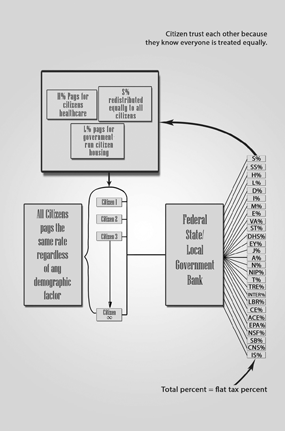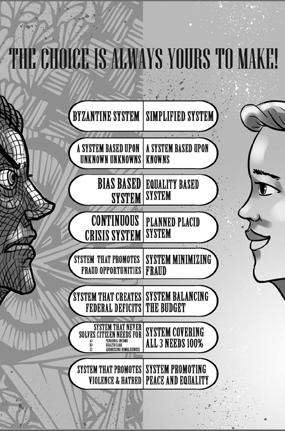The Byzantine Pineapple (Parts 1, 2 and 3)
It is said that The Definition of Insanity is doing the same thing over and over again expecting a different result. It is also said that The only people you know are sane are those let out of the insane asylum because they are the only people with a certificate of sanity; You don’t know about the rest of the people. Think about those 2 thoughts and look around you: There are plenty of insane people walking around because they keep yelling and fighting that either “the right” or “the left” are a political system that will permanently solve the issues of hunger & housing and health care for citizens of countries.
This is not to say that the world is not in a “better place” because of the efforts of “the right” and “the left.” Rather the issue is that both systems have run their course and they need an upgrade to a new system that melds the good pieces of both sides together while eliminating the corruption that dominates current socio-economic-legal-political (SELP) systems. Like the early versions of The Matrix the failures of the existing SELP systems have created an “escalating probability of disaster.” Like The Matrix there is a need to create a new SELP revision level to address the needs of the growing global human population.
There are 7+ billion humans on planet Earth. These 7+billion people are managed by 196 countries (plus odd authoritarian entities such as The United Nations or The Vatican or The Palestinian Authority or etc.). Each country/entity has its own SELP system. Each SELP system appears to have embedded system designed corruption that will never be eliminated by adding more patchwork laws upon more patchwork laws. To eliminate the corruption there needs to a new SELP system design. To believe otherwise fits the definition of insanity.
Currently there is a large schism globally between those on “the left” and “the right” driven by those who promote their political parties form of SELP as a way to govern citizens. Curiously though there are 4 common social goals between not only the “the right” and “the left”…and also Independents…that really seem to cover the vast majority of political differences:
1) Provide an income to each citizen
2) Provide health care (not health insurance) to each citizen
3) Provide some form of housing to each citizen
4) Treat Citizens Equally regardless of age or gender or race or religion or other dividing factors. Ask yourself this question: Which Political Party Entity has a SELP system which is known to 100% cost effectively:
5) Provide an income to each citizen?
6) Provide health care (not health insurance) to each citizen?
7) Provide some form of housing to each citizen?
8) Treat Citizens Equally regardless of age or gender or race or religion or other dividing factors
The answer is that NO Political Party Entity has a SELP system which is known to 100% cost effectively accomplish the 3 goals outlined above. The Definition of Insanity is doing the same thing over and over again expecting a different result. Since the end result of following the existing parties will be the same failures to accomplish the 4 primary goals…why continue to follow the existing parties?
This…in a nutshell…is what The Byzantine Pineapple both is and is about. The SELP systems governing humans are very Byzantine in nature as every year more and more laws are passed that increasingly make the governmental systems more and more Byzantine in nature. Annually, though, taxes are collected and those who get the tax money are those inside the Pineapple of government dole while those outside the Byzantine Pineapple get deterred by the outer defense mechanisms of the Pineapple. This is The Byzantine Pineapple.
The text The Byzantine Pineapple is about a new SELP system design that restructures the existing SELP systems into a new system that cost effectively achieves the 4 goals:
1) Provide an income to each citizen
2) Provide health care (not health insurance) to each citizen
3) Provide some form of housing to each citizen
4) Treat Citizens Equally regardless of age or gender or race or religion or other dividing factors
Globally there is a growth of political Independents; citizens independent from the existing political parties in their countries. More and more people globally see the political corruption going on with the existing SELP systems and they are leaving the main political parties in droves as they seek a new SELP systems solution.
Common Sense indicates to the Independents that such a SELP system does not yet exist. So, logically, until such a system is designed and agreed upon for implementation…the existing systems will continue to produce flawed results that will have some successes but are overwhelmingly failing because of the inherent system flaws. The inherent system flaws exist because:
a) Changing leadership isn’t going to solve the inherent system flaws.
b) Putting in term limits isn’t going to solve the inherent system flaws.
c) Making governments bigger and bigger with more Byzantinely worded massive omnibus bills that no one is thoroughly reading before voting on is not going to solve the system flaws.
Redesigning the system to address the system flaws is necessary to solve the system flaws. But to successfully redesign and implement system reform requires first having a comprehensive SELP system plan.
The author of this text is an American. This text uses the American governmental system to present the inherent system flaws in current SELP systems. However, it is the opinion of the author that the same inherent flaws in the American SELP systems exist in the rest of the approximate 200 different governmental SELP systems around the globe. There are certain common inherent SELP system construct flaws in all existing global systems that prevent achieving the 4 common goals.
Countries are “run” by either a permanent “dictatorial cabal” or the countries have some form of “free elections” that put people into power for some length of time. No matter what system exists there will always be some group that must be the ruling power. This is exhibited in nature with all the various ant colonies. There is always a queen up top ruling over all the various classes in the ant colony. Someone always rules. The trick is constructing a SELP system that actually achieves the 4 stated SELP system goals while also establishing control over the leadership by the populace.
If a person is a citizen of a “dictatorial cabal” then the citizen is subject to the whims of the those in power…and the first rule of those in power is to keep power as long as possible while the events of the world change around them. If a person is a citizen of a “freely elected government” then the citizen is subject to the whims of those in power. Ergo the way to design a new SELP system is to construct the system so that the citizens are more subject to consistent SELP system application instead of constant change based upon the whims of those in power.
Regardless of the country one is a citizen of the probability is that those in power have succeeded prior rulers\elected leaders. What occurs with the new power structure is that the new power structure creates more laws on top of all the laws that have already been established by prior power structures. These legal layers on top of decades or centuries of legal layers have created a Byzantine system.
The Byzantine system layers are like the layers of the Pineapple. Inside The Byzantine Pineapple is the tasty fruit but unless one has the machete to get at the fruit then one does not get to partake in the feast. Only those on the inside get to partake of The Byzantine Pineapple.
The Byzantine Pineapple Reviews
Just when I think I have learned the way to live, life changes.
Hugh Prather once said, “Just when I think I have learned the way to live, life changes.” In author Bill Poje’s novel The Byzantine Pineapple (Part 1) and Corporation X, readers are given an inside look into what exactly “The Byzantine Pineapple” is and why it’s important to incorporate change into the modern world order.
The book explores the concept of finding a way to adapt and grow with the changing population and world we live in. Referring to the laws and systems in which our society is governed as “Byzantine,” or outdated in nature. While the modern person is taxed by these outdated laws and regulations, the government officials reside within the metaphorical “pineapple” collecting and using that money while the average kept from enjoying the fruits of the labor by the outer shell or defense of that “pineapple.”
The author does a marvelous job of outlining the concept of this Byzantine Pineapple, going into how the current political and economic system works against the average citizen, how neither the left nor the right of political parties are able to grasp the right way to achieve the basic functions of a society in today’s age, and how our current societal, economic and political systems add layers of byzantine laws that continue to divide our social classes and disrupt our society as a whole.
This novel is perfect for anyone who seeks to understand how our society has evolved to the chaotic point it has gotten to. It is also for anyone who enjoys economic, political or societal analyzing reads, as well as anyone who enjoys studying business as a whole. I enjoyed it because for years now I’ve shared the same sentiment, albeit on a broader scale. The current laws, at least in the United States, have always been outdated to me. As our society grows, technology gets more complex and people become more open minded and accepting of things that were once considered “taboo” at one point or another, the laws of any given nation need to change or be rewritten to reflect these changes.
This is a must-read book, especially in our current turbulent times. The author’s background in economics and business make the concept of the book shine brightly, and the way the author lays out a comprehensive plan to get the four pillars of society (fair wage, housing for all citizens, healthcare coverage not insurance, and equality for all) makes it feel as if the average citizen can have hope for a brighter and more sustainable future. Even the second part of the text, which analyzes Corporation X (a global sales plan for the works of the author as books, movies and merchandise) was both entertaining and great to see strategically laid out for the reader to gain insight and a concept for how that business works. If you haven’t yet, be sure to grab your copy of The Byzantine Pineapple (Part 1) and Corporation X by Bill Poje today!
Pacific Book Review
Those inside the Byzantine pineapple gain, and those outside lose out. And whether morally right or wrong, it is all legal!
Anybody fed up with modern society has heard or repeated the classic axioms about the rich getting richer, the middle class attacking the lower class for using their tax money to sustain themselves, and how the system is designed to protect special interests while turning a blind eye to the everyman. In this book, the author approaches these issues head-on, proposing the demolition of needs-based systems in favor of blanket coverage for all people, so that anybody who needs healthcare (not health insurance) or a place to call home is covered. Additionally, a direct formula to make a flat tax rate possible is included, replacing the labyrinthine tax laws and loopholes with a simple formula of addition that explains how every dollar and cent is allocated. The ideas might seem radical or drastic to some, but big problems take big solutions.
Obviously, a book like this on a topical political issue will inspire some and incense others, but all can agree that the author is capable of taking very convoluted processes and ideas and distilling them down into simple English with a little humor and plenty of patience. The second half of the book is a bit more personal and addresses the reader directly, providing a unique business plan and vision for a company to produce the author’s ideas into major motion pictures and provide the potential investor with the opportunity for financial gain. These two concepts might seem juxtaposed and disparate but intertwine naturally in order to get this book’s important message in the hands of the people. Full of references to pop culture and literature, the author states his vision for a better world clearly and gives readers hope for a potentially better tomorrow.
book review by Michael Radon
Poje furnishes a sweeping critique of the current American systems of law, economics, and governance, and proposes an alternative.
According to Poje (Painless, 2008) the American “socioeconomic legal political system,” or SELP, is so thoroughly plagued by “inherent flaws” that it can’t be remedied by a series of targeted tweaks—it must be entirely replaced. At the heart of the problem is a gratuitously impenetrable complexity: The legal system is so “arcane” that no citizen understands it, and each citizen is necessarily involved in some illegal activity. Likewise, the tax system is similarly labyrinthine and seems chiefly designed to pit citizens against one another in a contest for resources. Finally, a burgeoning matrix of social welfare programs is doomed to fail to treat citizens equally, again inevitably stoking the flames of class conflict. Instead of a well-functioning society, Americans are subjected to a “Byzantine pineapple,” which the author attempts to explain this way: “Those who get the tax money are those inside the pineapple of government dole, while those outside the Byzantine pineapple get deterred by the outer defense mechanisms of the pineapple.” It”s never entirely clear what precisely he means by this demarcation—the principal point seems to be that such a system necessarily involves favoritism. The author proposes that the current tax system be replaced by a flat tax—he includes a macroeconomic formula to determine its specific nature—and an equal monthly stipend for all citizens. He recommends the termination of needs-based government programs, though the government would pay all medical bills. Poje anticipates that a streamlined SELP, including a government hamstrung by tight spending limits, will produce ample tax revenue to cover the new costs. The author also outlines the establishment of a corporation to steward these changes, which includes the marketing plan for a movie that further educates Americans about the SELP he advocates. Poje’s critique is sensible if familiar—it’s hard to argue that the current tax regime isn’t monstrously bloated. However, his study offers hyper-general declaration in the absence of detailed analysis—a more rigorous empirical appraisal would have been more helpful than a chapter on the way his “lifetime of achievement” justifies his expertise. Also, while admits he has no background in film, he seems quixotically convinced his will be a big hit and “it will succeed where Ben-Hur failed.”
Overly broad declamation and triumphalism crowd out scrupulous analysis.
KIRKUS
Poje purposely couches his problems and solutions in “simplistic” terms that “common people” will understand
Bill Poje’s The Byzantine Pineapple (Part 1) with Corporation X is comprised of two disparate books: one political and the other about his book and film projects.
In the first (Byzantine Pineapple) Poje, who holds an MBA, outlines what he believes is wrong with America’s “socioeconomic legal political” system. He criticizes the norm of political administrations whose “first rule…is to keep power as long as possible”, the inequity of laws enriching “those at the top,” and a “Byzantine” layering of impossibly complex regulations. He also decries the “inherent flaws of needs-based social welfare programs” and the problems with a national budget based on assumptions concerning factors like the annual inflation rate. Among ho solutions are a flat tax comprised of designated subrates to control funding for each government department and provide money for the health care and income of each citizen.
Poje purposely couches his problems and solutions in “simplistic” terms that “common people” will understand. Unfortunately, this approach leads to over-generalization. For instance, he states that U.S. laws have “basically made all citizens illegal”, a statement woefully lacking in the support necessary to make it believable.
In the second book (Corporation X), Poje describes his completed books and book and movie proposals and explains why potential investors should have confidence in them. In particular, he gives the business plan for Painless, an action/crime film, and seeks to demonstrate by his critiques of other films (Ben Hur, Sea of Trees, etc.) why he would be a successful writer and producer. These critiques, except for one, are aimed at future shareholders and are comprised, largely, of analyses of data obtained from websites like Rotten Tomatoes and IMDb.
As such, Corporation X is unlikely to interest any but potential investors. Meanwhile, The Byzantine Pineapple would reinforce the ideas of like thinkers but needs far more documentation to interest most readers. Overall, it’s hard to imagine an appropriate audience for this work combining two wildly diverse topics.
Blue Ink Review
It’s a self-assured if off-kilter book that stakes out positions on federal borrowing, a flat tax, and Hollywood financing.
Bill Poje’s idiosyncratic The Byzantine Pineapple (Part 1) with Corporation X presents outside-the-box ideas about politics and entertainment.
Divided into two treatises—one regarding federal government operations, particularly related to budgeting, and the other an argument for adapting Poje’s previous book into a movie that draws on the examples of recent, high-grossing films—the book advances a quirky point of view about institutions it sees as in need of radical innovation.
It’s a self-assured if off-kilter book that stakes out positions on federal borrowing, a flat tax, and Hollywood financing. The books two parts share a distinct perspective and common sensibility, if they otherwise don’t share a thematic connection. Little holds the pieces together beyond the narrator’s conviction that he knows better than the establishment.
Cynical and antiauthoritarian, the book challenges “lies” from institutions like the media, government, lobbyists, academics, and “unionists.” It depicts regular people as “asleep in the matrix” and subject to larger forces outside their control. The political section makes a case to independents that neither ideological side works and purports to apply a systems analysis approach to solve socioeconomic, legal, and political problems like hunger.
Both essays are peppered with pop culture allusions to movies like The Matrix, Blade and Resident Evil, if these connections are sometimes scattershot. A rambling rumination on the remake of Ben-Hur cites a Wikipedia page, undermining the general sense that this is a well-researched work. More authoritative references, including to Paul Krugman and The Wall Street Journal, are also included.
The essays run too long and come to include rambling ruminations on topics such as why particular movies did not resonate with modern audiences; the central arguments are returned in a roundabout way that runs through repetitions and hypotheticals. The book is prone to self-promotion that stretches credulity. A “10-year, $6 billion sales plan” for adapting Poje’s novel to film is thorough and includes garish graphics; it ultimately seems better suited to a pitch meeting than to a book intended for public consumption.
Florid prose makes use of odd figurative language, including with the central metaphor of how people are separated from institutions “by the outer defense mechanisms of the pineapple.” The books literary conceits contrast with its more business like passages, its extensive itemizations call to mind PowerPoint presentations, and even through comprehensive breakdowns, its knowledge sometimes feels abstract.
The Byzantine Pineapple (Part 1) with Corporation X blazes its own path as it works to persuade others of its unique world view.
Foreword Reviews
What I really enjoyed about this book is how the author wasn’t making any predictions in the first half of the book.
The Byzantine Pineapple: Part 1 with Corporation X by Bill Poje is a narrative on how the current socioeconomic conditions of the USA are deteriorating and how these can be improved. The book raises some very courageous questions and, after asking them, the author proposes some very valid answers and solutions. Mr. Poje is of the opinion that every citizen should be treated equally, especially in regards to medical facilities and housing. He is not just making claims; he refers to the Federal Budget of 2013 and draws conclusions as to what he proposes is beneficial for people across the board. While the rich get richer and the poor become poorer, the author specifically attacks this and asks the government to take a step back, look at the bigger picture and try to tackle the issue in the best possible way. Flat tax rate and transparency as to where the tax money goes are also addressed very eloquently. In the second half, the author talks about how his works (some of which I have read) can be made into motion pictures and can be financially lucrative for investors. He lists the pros, gives solid data and allows the reader to think about it.
What I really enjoyed about this book is how the author wasn’t making any predictions in the first half of the book. He was presenting an idea based on his research and allowing the reader to have some food for thought. His ideas are very interesting and if they are worked upon, they can become a very good first step for equal treatment in the country. What really drew me in was how hopeful and clear the message was. The author is literally inviting the reader in and helping them to draw their own conclusions, allowing them to have their own thoughts and make their own decisions. The simple yet powerful word choice is an essential part of the book; it made the reading experience even better. All in all, this is a book for readers who would like to think ahead, but with sound reasoning. A good approach that can be beneficial for the masses, if applied.
Reviewed by Rabia Tanveer for Readers’ Favorite




